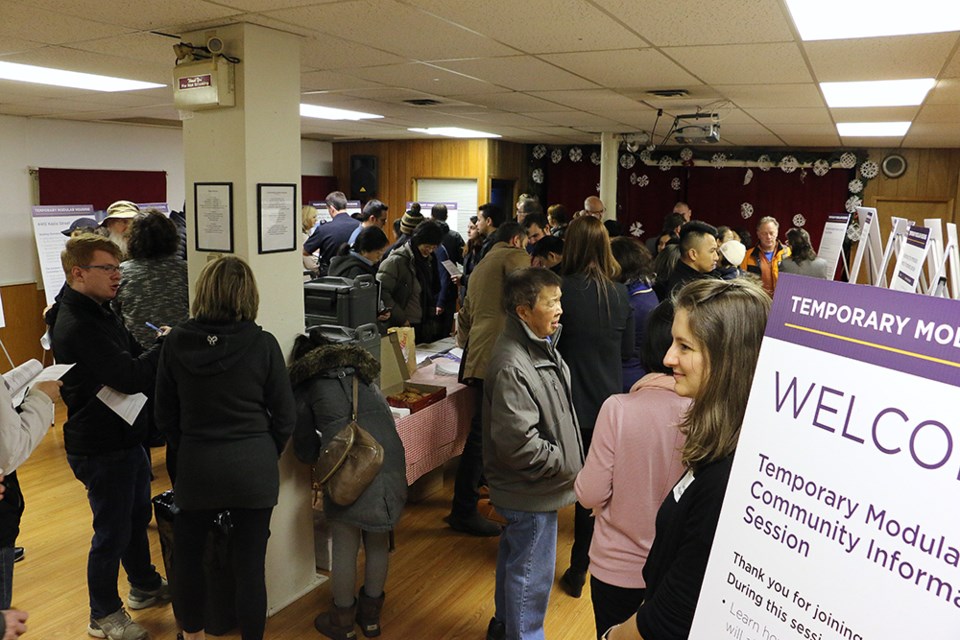Though some Collingwood residents are open to housing homeless people at the Kaslo Street project, others remain resistant, citing a lack of clear and timely information on who will live at the units.
The City of Vancouver continued its information sessions on temporary modular housing Wednesday night at the First Hungarian Presbyterian Church, one block north of 4410 Kaslo St., where the city is turning a community garden into additional units for the homeless. Most of the approximately 60 attendees ambling quietly about the meeting room in the basement of the church, reading the informational billboards or chatting with representatives from the city and organizations behind the project.
However, Fernando Medeiros, a carpenter who has lived in the area since the 1960s, was not pleased the city chose a site in a largely residential neighbourhood and voiced his dissent emphatically.
“This is bulls***. They’re putting our kids and our families in jeopardy here. Junkies, needles, crime. There are already two half-way houses in the neighbourhood,” said Medeiros, who claimed the Kaslo Street site is only zoned for townhomes and single-family houses and that the city should move the project to a commercial area instead. He said the modular housing project would attract more of the same problems.
“We pay high taxes here, so why do we have to have this? This is what I was expecting. I thought our voices would be heard here. It’s a piece of paper in a box — that means nothing to me,” Medeiros said about the suggestion boxes the city uses to collect neighbourhood feedback.
Last September, the city granted the development permit board and Gil Kelly, the director of planning and development, “discretionary development power.” It allows them to make zoning decisions for sites that will have at least 70 per cent low-cost housing for people in need, such as temporary modular housing.Kelley is also a member of the four-person development permit board.
Mina Amador, a retired nurse who has been a resident in the area for 10 years, came to the open house to gather more information about the project before settling on a definite position.
“We want to help the homeless right now,” Amador said, adding that she has noticed criminal behaviour around the 29thAvenue SkyTrain station and that she and her family are afraid to go to the area, especially at night. “With this temporary modular [housing], I want to understand what it is [and] who will be staying there. We will support, if it is safe for the residents.”
The Kaslo modular housing project, which will sit across from the 29thAvenue SkyTrain station will feature 50 units, and once completed, will be managed by Atira Property Management. Janice Abbot, CEO of Atira, said she will meet with the president of the Collingwood Neighbourhood House in the coming weeks to further discuss the needs of the homeless population in the area. She could not give details on the eventual tenant mix or what specific services Atira will have to supply once the housing is up and running.
“We will offer some of the typical services — staff 24/7, assisting folks to get to medical appointments and get onto income assistance, assisting folks to get identification, just all of those practical day-to-day activities that support workers do,” Abbot said. “Once we understand better who the [residents of the modular housing] would be, our programs and services may be tailored a bit to meet the needs of that particular population group.”
Abi Bond, director for affordable housing for City of Vancouver, said the city is in talks with the park board to relocate the Still Creek Community Garden, which currently sits on the project site, to Slocan Park across the street.
“Ultimately, we’d like to use the site for long-term, permanent affordable housing,” Bond said about the future of the land.
The city also held an information session Dec. 8 for modular housing developments at 501 Powell St. and the 1100-block of Franklin Street. On Friday, homeless residents of the Sugar Mountain Tent City, which sits on the Franklin Street site, will hold a rally against an eviction notice served to them by the city. They ask for permanent, tenant-run housing and argue the city is using heavy-handed tactics to evict and house them.
In Marpole, protesters against modular housing at the corner of 57th Avenue and Heather Street are fighting an injunctionissued by the courts for their obstructing of construction work that threatened to delay the completion of the project. The protesters say the project’s close proximity to three schools endangers their children and they want a public hearing on it.
City Hall is planning to build a total of 600 modular housing units with the help of the provincial government over the next year at a cost of $66 million. The city is also considering an expansion of an additional 600 units.



